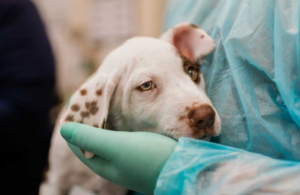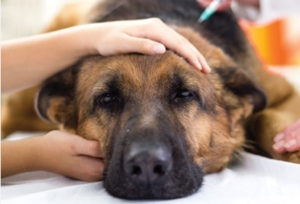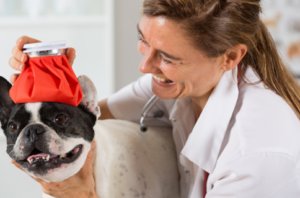Canine influenza, commonly known as dog flu, is a highly contagious respiratory disease that affects dogs and, in some cases, cats. In Greensboro, as in other regions, pet owners need to be vigilant about the risks, symptoms, and prevention of this illness to protect their furry companions. This article provides a detailed overview of Canine Influenza in Greensboro, focusing on its symptoms, causes, treatment, and prevention, tailored specifically for pet owners in Greensboro.
What Is Canine Influenza?

Canine influenza is caused by specific strains of influenza viruses, with two primary strains identified in dogs:
- H3N8 Virus: Originally identified in horses and later transmitted to dogs.
- H3N2 Virus: Believed to have originated in birds and spread to dogs. This strain has been more prevalent in recent outbreaks.
Both strains are highly contagious and can spread rapidly in areas where dogs congregate, such as parks, grooming salons, boarding facilities, and veterinary clinics.
How Does Canine Influenza Spread?
Canine influenza spreads through respiratory droplets when an infected dog coughs, sneezes, or barks. The virus can also survive on surfaces, including:
- Dog bowls and toys
- Kennels and bedding
- Human clothing and hands
This makes communal spaces particularly risky for the transmission of dog flu.
Symptoms of Canine Influenza
Symptoms of canine influenza can range from mild to severe, and not all infected dogs will show signs. Common symptoms include:
- Coughing: Persistent, dry, or moist coughs resembling kennel cough.
- Sneezing: Frequent sneezing accompanied by nasal discharge.
- Fever: Elevated body temperature, often exceeding 103.5°F.
- Lethargy: Decreased energy levels and reluctance to engage in normal activities.
- Loss of Appetite: A noticeable reduction in eating or drinking.
- Nasal and Eye Discharge: Clear to thick mucus from the nose or eyes.
In severe cases, canine influenza can lead to pneumonia, making early detection and treatment critical.
Diagnosing Canine Influenza
If you suspect your dog has canine influenza, consult your veterinarian promptly. Diagnosis typically involves:
- Physical Examination: Assessing your dog’s symptoms and listening to their lungs.
- PCR Testing: A laboratory test that detects the presence of influenza virus RNA.
- Blood Tests: To rule out other conditions and confirm the presence of the virus.
- Chest X-rays: In severe cases, X-rays may be used to check for pneumonia.
Treatment Options for Canine Influenza

There is no specific antiviral medication for canine influenza, but supportive care can help your dog recover. Treatment options include:
- Rest: Ensuring your dog has a quiet and comfortable place to recover.
- Hydration: Providing plenty of fresh water to prevent dehydration.
- Medications: Your vet may prescribe anti-inflammatory drugs, antibiotics for secondary infections, or cough suppressants.
- Hospitalization: In severe cases, dogs with pneumonia may require oxygen therapy and intensive care.
Most dogs recover within 2-3 weeks with proper care.
Preventing Canine Influenza in Greensboro

Preventing canine influenza involves a combination of vaccination, hygiene, and responsible pet ownership. Here are key steps:
1. Vaccination
The canine influenza vaccine is available and provides protection against both H3N8 and H3N2 strains. While it does not guarantee immunity, it significantly reduces the severity of symptoms and the spread of the virus. Talk to your veterinarian about whether the vaccine is suitable for your dog, especially if they frequently visit high-risk areas.
2. Avoid High-Risk Areas
Limit your dog’s exposure to communal spaces during outbreaks. Pay attention to local news or updates from Greensboro’s veterinary community regarding any reported cases.
3. Practice Good Hygiene
- Wash your hands thoroughly after handling other dogs.
- Disinfect surfaces, toys, and bedding regularly.
- Avoid sharing bowls or toys between dogs.
4. Monitor for Symptoms
Keep a close eye on your dog’s health and consult your veterinarian if you notice any signs of respiratory illness.
Can Humans Get Canine Influenza?

Currently, there is no evidence that canine influenza can spread to humans. However, humans can act as carriers, transferring the virus from one dog to another through clothing or hands. This underscores the importance of hygiene when handling multiple pets.
Local Resources in Greensboro
Greensboro offers several resources to help pet owners manage and prevent canine influenza:
- Veterinary Clinics: Many local veterinarians provide diagnostic and treatment services for canine influenza.
- Dog Parks: Check with Greensboro dog parks for any restrictions or advisories during outbreaks.
- Pet Boarding Facilities: Choose boarding facilities with stringent hygiene protocols and vaccination requirements.
- Community Updates: Stay informed about outbreaks through local news or veterinary associations.
When to See a Veterinarian
Contact your veterinarian immediately if:
- Your dog shows persistent coughing, lethargy, or fever.
- Symptoms worsen or fail to improve after a few days.
- You suspect exposure to an infected dog.
- Early intervention can prevent complications and ensure a faster recovery for your pet.
Conclusion
Canine influenza is a serious but manageable condition that requires vigilance and proactive care. By understanding the symptoms, seeking prompt veterinary attention, and taking preventive measures, Greensboro pet owners can protect their dogs from this contagious illness. Remember, your veterinarian is your best ally in safeguarding your pet’s health. Stay informed, practice good hygiene, and ensure your furry friend is up-to-date on vaccinations to minimize risks.
If you found this guide helpful, share it with other pet owners in Greensboro to spread awareness about canine influenza and its prevention.
